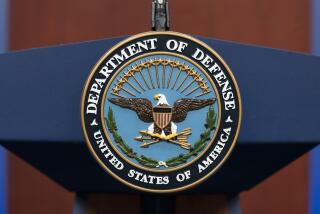Senate hears from victims of sexual assault in the military
- Share via
WASHINGTON — Survivors of sexual assault in the military urged lawmakers to require independent review of claims, taking the final authority out of the hands of high-ranking officers who have in some cases reversed decisions by military juries. That, they testified in a Senate hearing Wednesday, is the best way to end widespread underreporting of sexual assaults in the military.
In the first Senate examination of sexual assault in the military in nearly a decade, the Senate Armed Services subcommittee on personnel weighed a range of potential solutions to a long-standing problem that permeates every branch of the military.
The controversy was amplified by a recent case in which an Air Force lieutenant general overturned a military jury’s verdict and sentence for Lt. Col. James Wilkerson, who had been found guilty of sexual assault and sentenced to one year in prison.
Sen. Kirsten Gillibrand (D-N.Y.) pressed officers from each branch of the military who were assembled at the hearing on whether they thought justice was served in that case. She asked them whether they thought the jury was mistaken. In her view, Gillibrand said, “justice was not done.”
Rebekah Havrilla, a survivor of military sexual assault who has become an advocate of reform through the Service Women’s Action Network, said the Wilkerson case was a high-profile instance of a common occurrence in the military.
Of the 2,439 formal reports submitted in 2011, only 240 proceeded to trial. Anonymous surveys of military personnel for the same year showed that 19,000 instances of sexual harassment or assault went unreported in 2011.
Havrilla testified she had endured sexual harassment and been raped while serving in the Army in Afghanistan. She hesitated to report the rape because she had seen previous accusations against her commanding officer go nowhere. Also, she added, “the unit climate was extremely sexist and hostile in nature toward women.”
Havrilla and other survivors described an “old boys club” atmosphere among military officers that causes complaints to be suppressed.
Military officers testified about a number of efforts in recent years to improve training of investigators. The Air Force has implemented a pilot program to provide independent counsel for victims.
The officers raised concerns that the outside reviews suggested by reform advocates could threaten the leadership roles of commanding officers and could slow responses to the reports they do receive.
More to Read
Sign up for Essential California
The most important California stories and recommendations in your inbox every morning.
You may occasionally receive promotional content from the Los Angeles Times.













